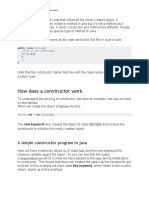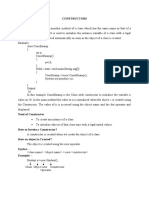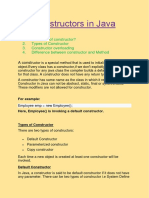0% found this document useful (0 votes)
81 views9 pagesCONSTRUCTOR
Constructors are special methods in classes that are used to initialize objects. They are automatically called when an object is created and allow values to be assigned to object attributes. There are different types of constructors including default, parameterized, and overloaded constructors. Default constructors are provided by the compiler and initialize attributes with default values if no values are specified. Parameterized constructors take parameters to initialize attribute values. Constructor overloading involves using multiple constructors with the same name but different parameters to initialize objects in different ways.
Uploaded by
Aakriti MehtaCopyright
© © All Rights Reserved
We take content rights seriously. If you suspect this is your content, claim it here.
Available Formats
Download as DOCX, PDF, TXT or read online on Scribd
0% found this document useful (0 votes)
81 views9 pagesCONSTRUCTOR
Constructors are special methods in classes that are used to initialize objects. They are automatically called when an object is created and allow values to be assigned to object attributes. There are different types of constructors including default, parameterized, and overloaded constructors. Default constructors are provided by the compiler and initialize attributes with default values if no values are specified. Parameterized constructors take parameters to initialize attribute values. Constructor overloading involves using multiple constructors with the same name but different parameters to initialize objects in different ways.
Uploaded by
Aakriti MehtaCopyright
© © All Rights Reserved
We take content rights seriously. If you suspect this is your content, claim it here.
Available Formats
Download as DOCX, PDF, TXT or read online on Scribd
/ 9
























































































